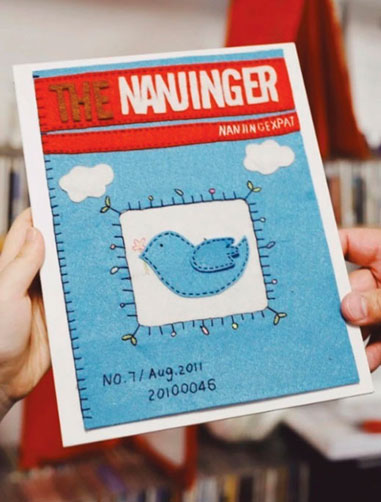During my recent visit to Nanjing I was waiting in line at Xinjiekou Metro Station for Line 2. The young lad in front of me mentioned something to his female companion containing “Mouchou Hu”. That place name stuck out; he pronounced it “Mou2chou1hu4”. Native speakers and avid learners of Chinese immediately recognize that it must be “Mou4chou2hu2”. The English announcement for this very station also mispronouces the Chinese. Why?
Was the guy somehow marking the precence of the laowai behind him with such non-standard pronunciation? Was this just a sign of my paranoia after spending more than seven years in China? I had often been reflecting about attitudes toward foreign people and languages, with me mostly working in language teaching; the very frontier of encounter and exchange between China and the West, the receptiveness of many students and willingeness of colleges and private language schools to accept foreigners as regular, long-term and well-informed teaching staff members. Or, very often, the refusal thereof.
During my metro ride to Nanjing University Xianlin Campus the same firm and gentle female voice treated me with “Xi1An1Men4” or “Yang2shan1Gong1Yuan4” while the Chinese announcement got it always right with “…Men2” and “…Yuan2”. A brief reminder of the importance of the correct “tone” or pitch of syllables in Chinese is in place; a different pitch for the same syllable changes its meaning. This can be funny, as in the change from “men2” (gate) to “men4”, which can mean “depressed, beaten down”. But did a foreign lady record those announcements? Certainly not; her pronunciation is usually correct while typical weaknesses in her English occassionally surface. Years ago I asked students about her. One group assured me that no offence was intended; “she just tries to make it easier for foreign ears to understand”. Another group knew that the lady had worked at China’s leading private language school and was pursuing a degree in the U.S. at that time.
My date in Xianlin was my son, of mixed Chinese and German parentage (he has taken it to his heart that he is not “half-half” but both, each 100 percent), whom I picked up from school and accompanied to the little private school where he did his homework under supervision. For his friends I was a sensation. While they did not seem to think about talking to me, they incessantly asked about me and, now it was obvious, mocked foreigners’ Chinese. “Wo3ai2ni4!!!” (instead “..ai4ni3”) may feel to Chinese ears as “I luvaa yo” to English speakers’ ears but possibly more wretched, more of a failed attempt to get through and master a language.
Far from blaming those seven-year-olds, I have been asking myself what has been spreading this kind of jest among adult Chinese in the years of the new century. I traced it back to mockery over some of China’s ethnic minority peoples’ attempts to get Mandarin pronunciaton right, especially the Muslim, Turkic minority of Uyghurs. As more foreigners came and tried to, yes, learn comprehensible Chinese, this little fashion of taunting a marginal but highly visible group found them, us, as a target. Does it not it quite befit the delicate and ambivalent relationship between China and the West, very much the sentiments toward “laowai” (the Latin American “gringo” or at times even the Afro-American “whity” in Chinese) within “their” country? That may be a field of wild speculation about a shape-shifting, multi-facetted sociocultural reality, with the accompanying issue of immigration that is sensitive in almost any country. The takeaway for now could be thus. Some Chinese like to taunt foreigners, but not as humilatingly as often done in the Western world, see for example immigrants from Eastern or Southern European countries speaking “Tuerkendeutsch” (“Turks’ German”). It spotlights the levelling of social hierarchy in an international society, the “white, English-speaking trumps all” and even a further step of foreigners’ yet-to-be-accomplished arrival in Chinese society; yes, remember those innocuous TV-shows featuring Chinese-speaking laowai making fun of their own group through laowai Chinese garble, besides an important factor to make Chinese think regular laowai speak in just such ways.
It also reflects how Westerners finally and laudably humble themselves by turning the tables in language learning. “Now I have to learn Chinese and even try hard” instead of “They have to learn English, read it everyday and listen to me”. It also points to the observation that language, especially the propagation of foreign language; who learns whose language and who doesn’t (need to) learn another’s, is a reflection of power of economies, social groups, and, in a dictinctly non-Western or “white” point of view, races. A deeply unequal, post-colonial world is slowly fading. While this may not be to the advantage of most readers of this magazine and that mockery in the face of well-meaning and courageous attempts to learn the “native tongue” is lacking this very minimum of kindness at the heart of civilization, it may be worth to stop, think and face the signs of our times, even in those tiny details which seldom pierce through the veil of our daily business.
This article was first published in The Nanjinger Magazine, February 2015 Issue. If you would like to read the whole magazine, please follow this link.











